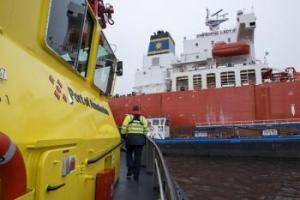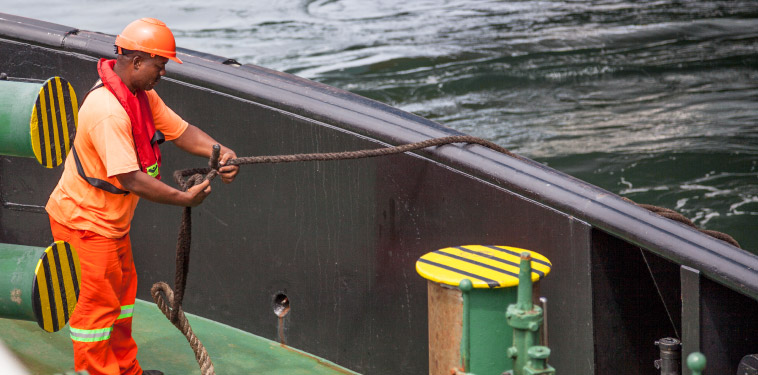Harbour Master
Harbour Masters
Worldwide there are approximately 3,000 merchant ports and the work of the Harbour Master can vary widely from country to country and from port to port even within the same country.

A port's navigational safety policy underpins the Harbour Master's responsibility for the safety of navigation. The navigational safety policy, which should be approved by the highest level of management within a port, usually a board of directors, is a publicly available document which states what the board holds itself responsible for in respect of the safety of navigation within its area of jurisdiction.
The reputation of a port is dependent on its safety record and efficiency. Any damage to a port’s safety record may impact on its reputation and by extension, its trade.
The Harbour Master plays a key role in the development and implementation of a safety management system which manages the hazards and risks associated with port operations along with any preparations for emergencies. This should be operated effectively and revised periodically.
Some countries provide guidance to their ports on port safety. An example of this is the UK’s Port Marine Safety Code and its accompanying Good Practice Guide can be found here.

To achieve a safe port, a Harbour Master must identify the hazards which present in the port and then assess the risks associated with those hazards. The risks must then be managed down to an acceptable level usually identified as the ALARP (as low as reasonably practicable) principle. This is the underlying principle of risk assessment – a practice that will not only lead to a safer port but may also help to reduce insurance premiums, a commercial benefit to the port company. Thorough risk assessments can be used not only in the formulation of better operating procedures but also in the formulation of effective emergency plans.
Navigational safety and care for the environment are governed by numerous international, national and local laws and regulations. Harbour Masters have to not only obey local by-laws but also enforce them. They may also be authorised to draft by-laws for their own ports. Port by-laws and admission policies set the conditions under which vessels may enter and leave the port and where they berth.
Rotterdam Port by-laws: https://www.portofrotterdam.com/en/files/rotterdam-port-management-bye-laws
Harbour Masters rely on reliable and accurate information to inform decision-making concerning the entry and departure of commercial shipping. The geographical configurations of the port, prevailing weather conditions, port water depths, and the height and strength of the local tides are some of the factors that a Harbour Master considers. This information and other factors will inform a port's navigational safety policy and at operational level affect the decisions concerning the arrival and departure of shipping. Harbour masters specify their entry requirements in great detail. These include safest approaches to a port, pilot boarding ground and details of advance notifications to be given to the port prior to arrival.
The arrival of a commercial vessel into a port is always a planned event. Notification of the vessel’s arrival sometimes begins weeks before the actual arrival. The vessel normally gives 72-48-24 hour notices to all the parties concerned and corrects the ETA (Estimated Time of Arrival) with every notice so as to be as close to their declared ETA as possible when arriving at a pilot station.
Pilot boarding and communication between the ship, pilot and port authority shipping control office or VTS are critical to the safe arrival of a ship as it proceeds to its intended berth.
Various agencies including the vessel’s designated Agents, the Harbour Master or his representative, the Pilot company, towage company and the stevedores working the vessel are involved with the arrival of a commercial ship into a port.
Points of notification are predesignated positions set by the Harbour Master when the vessel calls Marine Control on a pre-agreed VHF Channel and informs them of the vessel’s actual position. This information warns other vessels in the area of the incoming vessel’s progress and allows the Marine Controller or VTS to alert ancillary services, such as tugs and lines-boats.
The task of the pilot is to advise the ship’s master on passage through the port and its approaches. The pilot brings knowledge of the local maritime conditions and operational practices that have been gained through extensive experience of navigating ships in the restricted waters of the port and its approaches. Use of a pilot is compulsory in many territorial waters.
In most Member States legislation provides the possibility of some form of exemption from pilotage, either in the form of exemptions in the regulations for compulsory pilotage or by issuing Pilotage Exemption Certificates (PEC).
Many ports deal with big ships in confined or restricted areas and in many cases the risk of contact (allision) with port infrastructure and the risk of grounding is managed by the use of tugs. The use of tugs may be compulsory in some ports for some ships and this is one of the decisions the Harbour Master will make when considering safety of navigation. The Harbour Master may also monitor the competence and qualifications of tug personnel and the performance of tug operations.
High speed craft in port waters may pose potential risks to safe navigation, channel / bank erosion and danger to persons working under or around wharf structures. It may be necessary to manage the speed of high-speed craft in areas of risk. Engagement with high-speed craft associations will ensure that key risk areas are identified and managed appropriately. Use of AIS on commercial high-speed craft will allow monitoring by VTS / Port control.
Safe and efficient mooring processes are vital for ports and terminals. A ship breaking loose from its moorings is a hazard to other vessels and to port infrastructure. A drifting vessel may cause serious damage to cranes, cargo manifolds and fenders and injuries to staff ashore and afloat.
Appropriately trained shore-based berthing crews will work with ship crews to bring ropes or wires from the ship ashore and put them on the shore bollards by hand or with the use of winch trucks. This is a specialised activity involving significant safety issues.
IMO FAL.6/CIRC.11/Rev.1 GUIDELINES ON MINIMUM TRAINING AND EDUCATION FOR MOORING PERSONNEL
Cargo needs to be lashed safely and effectively. Lashing gangs may be dockworkers or authorised crew members (for instance on short sea RoRo (Roll-on/Roll-off) ferries). Deck cargo, containers and RoRo trailers on the weather deck are vulnerable because they can be hit by waves in bad weather and need special attention. For example, steel coils and other heavy cargo can shift during rolling and pitching when not properly stowed and lashed. When a ship arrives with a list due to shifted cargo, the harbour master is informed and will send a nautical expert on board to ensure that the ship will enter the port safely before providing a berth.
Founded in 2017, MarineLabs delivers high-resolution, real-time, and historical wind, wave, and weather data, as well as hyper-local 10-day forecasting, from a growing network of cloud-connected, rugged sensor nodes.
The International Harbour Masters Association (IHMA) and the Port of Rotterdam Authority are pleased to announce the 15th International Harbour Masters Association Congress, to be held from 09–12 June 2026 at Theater Zuidplein in Rotterdam.
Join the world’s premier professional body for harbour masters and receive up-to-date information on the industry and access to the members' area of the website.